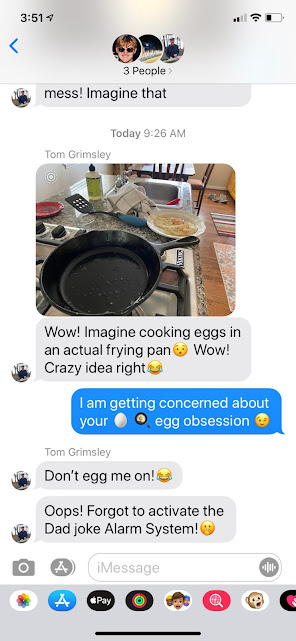 |
Tom's love for me shows daily when he brings me coffee. Since he cannot go to store anymore, he got quite perturbed with the boys for not keeping the fridge stocked with milk for my coffee! Tom leaves us these notes to express his feelings.
|
Explaining how Tom is doing is nuanced. General understanding of Alzheimer's is often tied to recognition of people. There are many years of this progressive terminal illness before that impact hits. I will illustrate with recent developments.
For the safety of our family and hers, our housekeeper of almost 30 years has not cleaned our home since March. I send pay her payments a few months in advance so she has no gap in income and can use the advance lump sum to help her financial obligations. I am sure her life is as scary as ours.
Thus, Sam and Noah cleaned one afternoon weekly for these past few months. They learned ALLOT! Sam went back to college last weekend thus we are losing his excellent cleaning skills (ha!) and the many other ways in which he helped our household function. Noah starts online school this week and his virtual meetings have already began. Our home of three must now adjust how we approach the many routine tasks.
I am trying to go at the various chores for keeping our home clean differently. We are going to attempt to ask Tom to help more. We must do it in a way that does not cause him stress and anxiety. It is important for Tom's sense of worth to stay active and that he continues to contribute to the family. This is why the caregiver's role is crucial.
We have to follow some rules:
- Tom helps between 9am and 3pm because after 3pm Tom's brain does not function as well and he usually goes to bed between 7:30pm and 8:30pm
- Shift from one day a week cleaning to doing a little bit each day
- Every task has to be broken down into one simple action at a time (no exaggeration)
- Patience, kindness and a sense of humor is needed at all times (really)
I started the new paradigm with cleaning our three bathrooms.I broke it down into 6 tasks. I would give Tom one task at a time handing him the right supplies. He would finish each task and wait for me in our bedroom to find him for the next task. Often, he and I had to wait until I had finished a work meeting or email or whatever for me to help him move to the next thing. Finishing the bathrooms was slow going but eventually he did it and the bathrooms looked awesome! And I was super grateful. And we are all helping each other which is the goal.
 |
I do have to go behind Tom and place things back. He cannot hold in his brain where things go. The hairdryer and brush do not go beside bathtub in towel cubby. This phenomena happens all over the house inside and outside.
|
And each day I have tried to approach other cleaning jobs in same way. One day was clean the kitchen. Another day was to windex the glass doors and windows.
Tom can fold laundry but asks for help on where to put away. He folds towels and stuff in all different ways which is fine! Truthfully, I have adjusted to this as I am one of those people who likes everything "just so" which is my hang up. Well ...truthfully ... sometimes I do refold ... I cannot resist ... but I am working on it!
Tom is able to load and unload dishes in/from the dishwasher with no reminders at all. However, it is a daily scavenger hunt to find where dishes are placed. Each time I open a cabinet or a drawer or even the fridge, I move dishes and utensils and spices and anything you might find in a kitchen. We rely on humor allot with this one. I only get frustrated when I am in hurry and cannot find something; fortunately this does not happen too much.
For those of you who know me personally, you know the universe is having a field day with my compulsive organizational personality and obsessive attention to detail - seriously - oh my.
This week Tom took clean sheets out of dryer and tried make a bed himself. He could not get past the fitted sheet. His brain could not connect how to get all the fitted corners on mattress. He calmly let me know and we did it together. Tom is remarkable. He has worked so very hard to not get too down when these missteps happens; he recognizes he is doing the best he can and does not beat himself up. I admire him for this tremendous act of self-care; we can all learn from him.
Tom's ability to hold actions in his brain is not great and decreasing. His spacial problem solving is almost gone. He cannot make any decisions. His brain cannot process at near the speed of the world around him and it breaks my heart to watch his face when he is trying. This is when you will see the tears well up in my eyes.
I do keep saying that Tom is still Tom and he is. His self-care is excellent and he can get through each day independently. His sense of humor and intellectual curiosity is always there. His giant love for his family is completely intact and apparent. For all of this we are beyond fortunate and I am truly grateful.





